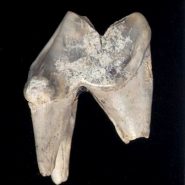
Tooth of an Alsatian dog discovered a mile from Stonehenge.
Archaeologists have discovered evidence of what they believe is the earliest known journey in British history: a 250-mile trip from York to Wiltshire made 7,000 years ago by a Mesolithic hunter-gatherer and his dog.
Scientific investigation of a dog’s tooth found at a site one mile from Stonehenge has thrown up a number of exciting discoveries, said archaeologist David Jacques, who leads the team digging at an encampment site called Blick Mead.
For one thing, it shows that Mesolithic man was using a domesticated dog, probably for hunting. But more fascinating is that the animal originally came from an area that is now the Vale of York, suggesting the pair made a long, gruelling journey.
Jacques said the findings showed the dog and people with it came to what is now Wiltshire. This is the earliest evidence of a journey that has been unearthed in Britain.
The clinching evidence was found by researchers at Durham University, who carried out an isotope analysis of the tooth enamel, which showed the dog drank water that came from the Vale of York area. They also speculate that the dog would have been roughly the same size, shape and colour of an alsatian, albeit more wolf-like.
Jacques said the Durham analysis was “a world first, it’s a big deal,” that substantially increased what archaeologists know about Blick Mead. “It is very hazy and this evidence just makes the glass slightly less dark, it is a significant movement forwards,” he said.
Previously, artefacts had been found which implied Mesolithic man had travelled long distances to get to the site. Jacques and his team believe people were coming to the spot over a near 4,000-year period, from 7900BC to 4000BC.
“It is an amazing sequence,” he added. “There is nothing like it in Europe and now we’ve got this evidence from the dog you start to piece it together. You can see that this place seems to have special to not just local people, it seems to have been drawing in people from long distances away and the sort of distances you would not expect for mobile hunter-gatherers.”
Jacques has led University of Buckingham digs at Blick Mead for nearly a decade, believing the area is key to the beginnings of people living in Britain because evidence of occupancy covers such a long period of time.